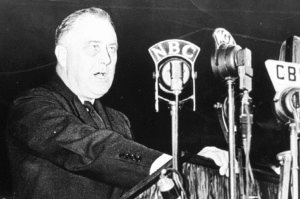- F. D. Roosevelt, “Quarantine Speech” with major newspaper editorial reactions (pdf; also in html below)
- Fireside Chat by F. D. Roosevelt, Sept. 11, 1941 (pdf)
- Speech by Charles E. Lindbergh, DesMoines, Sept. 11, 1941 (pdf)
- J. Edgar Hoover, Testimony on Red Fascism before the House Un-American Activities Committee (1947) (pdf)
- Martin Luther King, Jr. Excerpts from “Beyond Vietnam: A Time to Break Silence” (1967) (docx, pdf)
- Robert Colodny, “Spain and Vietnam” (1967) (pdf)
Excerpts from Roosevelt’s “Quarantine Speech” of October 5, 1937
…It is true that the moral consciousness of the world must recognize the importance of removing injustices and well-founded grievances; but at the same time it must be aroused to the cardinal necessity of honoring sanctity of treaties, of respecting the rights and liberties of others, and of putting an end to acts of international aggression.
It seems to be unfortunately true that the epidemic of world lawlessness is spreading. When an epidemic of physical disease starts to spread, the community approves and joins in a quarantine of the patients in order to protect the health of the community against the spread of the disease.
It is my determination to pursue a policy of peace and to adopt every practicable measure to avoid involvement in war. It ought to be inconceivable that in this modern era, and in the face of experience, any nation could be so foolish and ruthless as to run the risk of plunging the whole world into war by invading and violating, in contravention of solemn treaties, the territory of other nations that have done them no real harm and which are too weak to protect themselves adequately. Yet the peace of the world and the welfare and security of every nation is today being threatened by that very thing….
War is a contagion, whether it be declared or undeclared. It can engulf states and peoples remote from the original scene of hostilities. We are determined to keep out of war, yet we cannot insure ourselves against the disastrous effects of war and the dangers of involvement. We are adopting such measures as will minimize our risk of involvement, but we cannot have complete protection in a world of disorder in which confidence and security have broken down.
If civilization is to survive, the principles of the Prince of Peace must be restored. Shattered trust between nations must be revived. Most important of all, the will for peace on the part of peace-loving nations must express itself to the end that nations that may be tempted to violate their agreements and the rights of others will desist from such a cause. There must be positive endeavors to preserve peace.
America hates war. America hopes for peace. Therefore, America actively engages in the search for peace.
Click here to read the entire speech.
Press Reactions to President Roosevelt’s “Quarantine Speech”
From the New York Herald Tribune:
President Roosevelt, for all his eloquence at Chicago, cannot be credited with anything…specific. His world audience no doubt thinks that much of his speech had reference to Japan. But he did not say so. His talk of “quarantine” may be construed as an endorsement of economic sanctions but he did not mention them. His appeal was wholly emotional. It named no names. It cited no specific treaty clauses that are in default and no specific way of resenting treaty violation. If it was an appeal for anything it was a popular emotional mandate to the President to take whatever course in our international relations seemed to him the best.
From the Washington Post:
This speech, coming at the psychological moment, may well foreshadow a turning point in world history. The forces now fighting intolerable aggression, whether in the case of the Chinese at Shanghai or the Spaniards defending Madrid, are neither cowards nor weaklings. They are prepared to carry on the fight for human decency unaided. But with the assurance that the United States has not forgotten all moral standards in its ostrich hunt for security, the strength of their resistance will be redoubled. President Roosevelt has only to make explicit the assurances implied in yesterday’s speech and the turn toward peace will, for the first time since 1931, become apparent.
From the Boston Herald:
The mantle of Woodrow Wilson lay on the shoulders of Franklin Roosevelt when he spoke yesterday in Chicago. It may be true that “the very foundations of civilization are seriously threatened.” But this time, Mr. President, Americans will not be stampeded into going 3,000 miles across water to save them. Crusade, if you must, but for the sake of several millions of American mothers, confine your crusading to the continental limits of America!
From the Chattanooga Times:
Did Mr. Roosevelt intend to indicate, as it is apparently believed in some quarters, that the United States will join other powers and be contributing police work in the Far East and the Mediterranean, try to “quarantine” aggressor nations? Or does the President desire to encourage Great Britain and France to follow a more determined course in Europe and Asia, while standing on this nation’s traditional policy of isolation?
